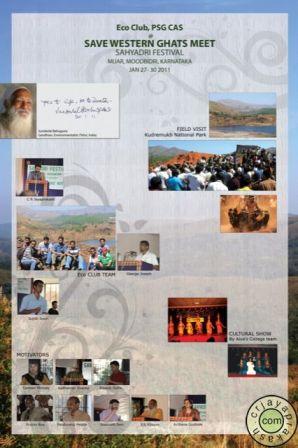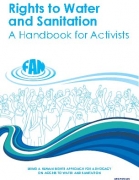/topics/voluntary-citizen-or-civil-society-sector
Voluntary Citizen or Civil Society Sector
Wetlands (Conservation and Management) Rules 2010 - Welcome, but a lost opportunity - Press release by SANDRP
Posted on 04 Feb, 2011 10:33 AMOn the occasion of the World Wetlands Day 2011, while we welcome the notification of Wetland (Conservation and Management) rules 2010 by the Union Ministry of Env
A report on Save Western Ghats Meet held at Moodbidri, Mangalore between 27th -30th January 2011
Posted on 02 Feb, 2011 03:11 PM
Grassroutes 2011, Road-trips for Social Change
Posted on 01 Feb, 2011 02:09 PM Grassroutes is a Fellowship Program that supports outstanding and passionate young people to go on road-trips for social change. The select group of young people will travel across India, meet change-makers, work with social ventures, learn about developmental issues, live with the community and return with stories of social change, which will enable them to inspire a larger community into taking action.
Grassroutes is a Fellowship Program that supports outstanding and passionate young people to go on road-trips for social change. The select group of young people will travel across India, meet change-makers, work with social ventures, learn about developmental issues, live with the community and return with stories of social change, which will enable them to inspire a larger community into taking action.
Right to water and sanitation - A handbook for activists by Freshwater Action Network (FAN) Global
Posted on 31 Jan, 2011 10:11 PM With tihs, they can improve water and sanitation service regulation and provision at international, national and local levels. Directed primarily at community groups, human rights NGOs, rights-based development practitioners and aid workers, this handbook aims to strengthen human rights-based advocacy by providing innovative and practical suggestions that activists and organisations can use in their work. It also acts as a resource guide for finding further information.
With tihs, they can improve water and sanitation service regulation and provision at international, national and local levels. Directed primarily at community groups, human rights NGOs, rights-based development practitioners and aid workers, this handbook aims to strengthen human rights-based advocacy by providing innovative and practical suggestions that activists and organisations can use in their work. It also acts as a resource guide for finding further information.
Water and sanitation are essential for living a healthy life with dignity. However, around a billion people across the world lack access to a safe and sufficient water supply to cover their basic needs. Over 2.5 billion people lack access to adequate sanitation and nearly 1.2 billion face the indignity of open defecation every day.
The Millennium Development Goal (MDG) target to halve the proportion of people without sustainable access to safe drinking water and basic sanitation by 2015 is seriously off track, with sanitation severely lagging behind. For example, estimates suggest that at current rates of progress, sub-Saharan Africa will miss the MDG water target by about 25 years, while the sanitation target may not be reached until well into the 22nd century.
Irrigation tanks and their traditional local management - A remarakable ancient history of India - Paper presented at the National Seminar on Water and Culture (2007)
Posted on 31 Jan, 2011 03:20 AMTanks are rainwater harvesting techniques which capture water during monsoons for later use. Mention of tanks in colonial texts is made and the authors infer from ancient texts like Tamil Purananuru on the importance of tanks and the locations for their construction, as well detailing their geographical spread.
Applicability of traditional wisdom in water management in Konkan region of Maharashtra - Paper presented at the National Seminar on Water and Culture (2007)
Posted on 31 Jan, 2011 02:51 AMThe state government's investments in supplying potable water under the Maharashtra Jeevan Pradhikaran (MJP) scheme which envisaged a no tanker supply' end to the scheme is critiqued. The authors note that the project mainly concentrated on asset creation, neglecting operation and maintenance resulting in limited improvement in villages, with respect to water supply.
Dying wisdom of medieval water management of Aurangabad city - Paper presented at the National Seminar on Water and Culture (2007)
Posted on 31 Jan, 2011 01:40 AMThe city of Aurangabad has benefited from the construction of aqueducts and canals by its earlier rulers. According to the authors between 1617 and 1803, a number of aqueducts and canals were constructed.
Traditional water management practices and water sector reforms in South India - A comparative analysis of three systems and Participatory Irrigation Management policy - Paper presented at the National Seminar on Water and Culture (2007)
Posted on 30 Jan, 2011 06:13 PMThe authors study three tanks; one each in Karnataka, Andhra Pradesh and Kerala and find that almost all tanks in Southern India face similar problems that include farmers in command area being deprived of water, siltation, lack of proper maintenance of such structures, lack of political will to decentralise authority to tank institutions etc.
Traditional water management practices in coastal Karnataka - Paper presented at the National Seminar on Water and Culture (2007)
Posted on 30 Jan, 2011 04:10 PMTh paper begins with a brief history of the region of Southern Kanada, its geography and the religious practices of the region. Some of the key features of this region includes an abundance of rivers though they mostly are rain-fed.
Preservation of Mysore urban water bodies - Paper presented at the National Seminar on Water and Culture (2007)
Posted on 30 Jan, 2011 04:00 AMThis paper presents the status of lakes in Mysore. It gives emphasis to the Socio-Economic Natural Complex - Lake Ecosystems (SENCLE) model of lake preservation and management which includes socio-technical aspects of lake care.





